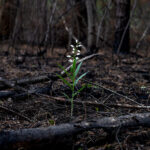By MARK HOWELL AND LAUREL RADOW , An Article Out Loud from the Domestic Preparedness, September 27, 2023.
A solar eclipse is a unique form of special event that does not always fall under emergency planning protocols, but it should. This article urges preparedness professionals to collaborate with eclipse planning committees to ensure the safety and security of all those involved.
Narrated by Bonnie Weidler.

Mark Howell
Mark Howell is a director and wildland fire/emergency management specialist for Grounded Truths LLC. He has 20 years’ experience in wildland and prescribed-fire planning and operations. His career began in central California and spans most regions of the United States. He has been recognized with numerous awards for wildfire prevention and mitigation leadership and innovation in the Pacific Northwest as a supervisory wildland fire prevention, mitigation, and education specialist in the Malheur National Forest in northeast Oregon.
- Mark Howellhttps://www.domesticpreparedness.com/author/mark-howell

Laurel J. Radow
Laurel J. Radow is an American Astronomical Society Solar Eclipse Task Force (AAS SETF) member and co-chair of the AAS Local Planning Working Group. She joined the Federal Highway Administration (FHWA), U.S. Department of Transportation in 1996. From 2004 until her retirement at the end of 2016, she served as a member of the FHWA Office of Operation’s Traffic Incident and Events Management Team. In that capacity, she served as program manager for the agency’s Evacuations/Emergencies and Planned Special Events programs and managed a range of Traffic Incident Management tasks. From 2014-2016, she served as vice chair of the National Academy of Sciences Transportation Research Board’s (TRB) Standing Committee on Critical Transportation Infrastructure Protection (AMR10). She recently completed her second and final term as chair of the same committee. In addition to co-chairing the TRB at the October 2018 Resiliency Conference (T-RISE), she also served as guest managing editor for the TR News September/October 2021 Issue no. 335, “State of Emergency: What Transportation Learned from 9/11.”
- Laurel J. Radowhttps://www.domesticpreparedness.com/author/laurel-j-radow
- Laurel J. Radowhttps://www.domesticpreparedness.com/author/laurel-j-radow
- Laurel J. Radowhttps://www.domesticpreparedness.com/author/laurel-j-radow
- Laurel J. Radowhttps://www.domesticpreparedness.com/author/laurel-j-radow








